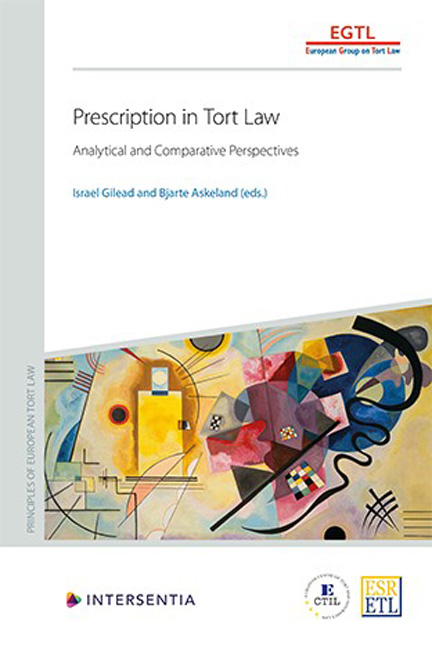Book contents
- Frontmatter
- Dedication
- Acknowledgements
- Contents
- List of Authors
- PART I THEORETICAL AND COMPARATIVE ANALYSES
- Analytical and Comparative Report
- Economic Analysis
- PART II PRESCRIPTION IN TORT LAW OUTLINED
- Case Scenarios
- Austria
- Belgium
- Czech Republic
- England and Wales
- France
- Germany
- Greece
- Italy
- The Netherlands
- Norway
- Poland
- South Africa
- Spain
- Switzerland
- United States
- European Union
- Appendix: Questionnaire
- About the Editors
Economic Analysis
Published online by Cambridge University Press: 22 December 2020
- Frontmatter
- Dedication
- Acknowledgements
- Contents
- List of Authors
- PART I THEORETICAL AND COMPARATIVE ANALYSES
- Analytical and Comparative Report
- Economic Analysis
- PART II PRESCRIPTION IN TORT LAW OUTLINED
- Case Scenarios
- Austria
- Belgium
- Czech Republic
- England and Wales
- France
- Germany
- Greece
- Italy
- The Netherlands
- Norway
- Poland
- South Africa
- Spain
- Switzerland
- United States
- European Union
- Appendix: Questionnaire
- About the Editors
Summary
INTRODUCTION
An initial inquiry into the economic analysis of prescription law, made more than a decade ago, led the author to the recognition that this kind of analysis is most complicated and that:
Given this complexity, it is doubtful whether substantiated conclusions can be reached regarding the efficiency of a given time limit or rule of prescription. Such a conclusion requires complex analysis of information of a kind and scope which is unattainable, “ the stuff that dreams are made of “ as Ronald Coase once said with regard to complex economic analysis. When such dreams do not come true, one can only hypothesize about the efficiency of time limits and rules of prescription.
After reiterating the very basics of economic analysis of law (Section II), this report, highlights, on the background of the ACR, the welfare measurement problems that plague the economic analysis of prescription law (Section III). It then focuses on the intricate interrelations and cross-effects between the legal variables that constitute prescription law, as analysed in the ACR, and the ensuing difficulties for reliable economic analysis (Section IV). At the same time, it is argued (Section V) that the very basic economic analysis nevertheless suffices to support two related claims made in the ACR: the claim that a major goal of prescription law should be the protection of potential Ds, and the consequential claim that broad judicial discretion in the application of the defence should be avoided. A short comment on prescription law and the fair distribution of wealth concludes (Section VI).
ON THE BASICS OF ECONOMIC ANALYSIS OF PRESCRIPTION LAW
WELFARE AND EFFICIENCY OF LEGAL RULES
Economic analysis of law focuses on the effects of legal rules on the aggregate well-being, welfare, in a given society. A legal rule which enhances net aggregate welfare is considered a more desirable rule than an alternative legal rule which generates less net aggregate welfare.
- Type
- Chapter
- Information
- Prescription in Tort LawAnalytical and Comparative Perspectives, pp. 123 - 132Publisher: IntersentiaPrint publication year: 2020

